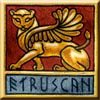
Munthuch is an Etruscan love Goddess and Goddess of health, one of the attendants of Turan. On one famous engraved mirror-back, Munthuch is shown helping the Bride-Goddess Malavisch get ready for Her wedding. With fellow attendants Zipu (or Zipanu) and Hinthial, She prepares the bride while Turan, the Love Goddess, watches from the side. Munthuch seems to be in charge of Malaviskh's make-up, as She stands before Malaviskh holding a brush or makeup applicator while holding Her face lightly between Her hands, as if adjusting Her crown or evaluating the artistry or symmetry of the make-up job so far. Munthuch is clad in a chiton pinned together in intervals along the arms, and wears a lot of jewelry including bracelets, rings, earrings, a necklace or two, and a wreath or crown. Elaborate openwork sandals are on Her feet, and Her chiton is of a nearly invisible transparency, through which the line of Her shapely legs and bottom are quite plain. Munthuch's name means "Elegance" (and She looks it), related words in Etruscan being munth "adornment", "order", or "honoring", and munthu "one who polishes". The Latin word mundus, of Etruscan origins, in its form as the female name "Munda" is sometimes used as the Latin translation of Munthuch's name. Mundus has the usual meaning of "the world" or "the universe" in the sense of that which is all-encompassing; but which carries the additional meaning of "ornament", "decoration", or "adornment of a woman". The Greeks, too, had a word that shared the same dual meanings, kosmos, meaning "order", "world order", "beauty", "female adornment", or "the universe" (and from which we get our word "cosmetics"); like the Latin, the related definitions share the underlying concept of rightness and good order. Does this mean then that when the ancients of the Classical world looked at a beautiful woman they saw the proper order of the universe? And conversely, that they saw the right order of the world as a beautiful, and inherently female, concept? And that adornment and beauty are necessary, in fact integral, to the proper rightness of things? Most ancient cultures saw the Earth or the World as female, as the great Mother Earth who nourishes and takes care of all Her children; perhaps this is also an intuitive recognition of the biological primacy of the female, for embryos are female by genetic "default" until given the hormonal signal to become male (which is why men have nipples), and single-celled organisms which reproduce asexually are called "mother" and "daughter" cells, for the simple reason that if the creature is reproducing, it is by definition female. The Latin word mundus is also used for "Mankind", meaning the general word for humankind as a whole; perhaps though, given its intricate connotations, the word should more accurately be translated into English as "Womankind", whose definition is "all of humanity". Alternate spellings: Munthuch, Munthux, Munthx, Munthkh; Munthu-kha is an older form. |
|
|



